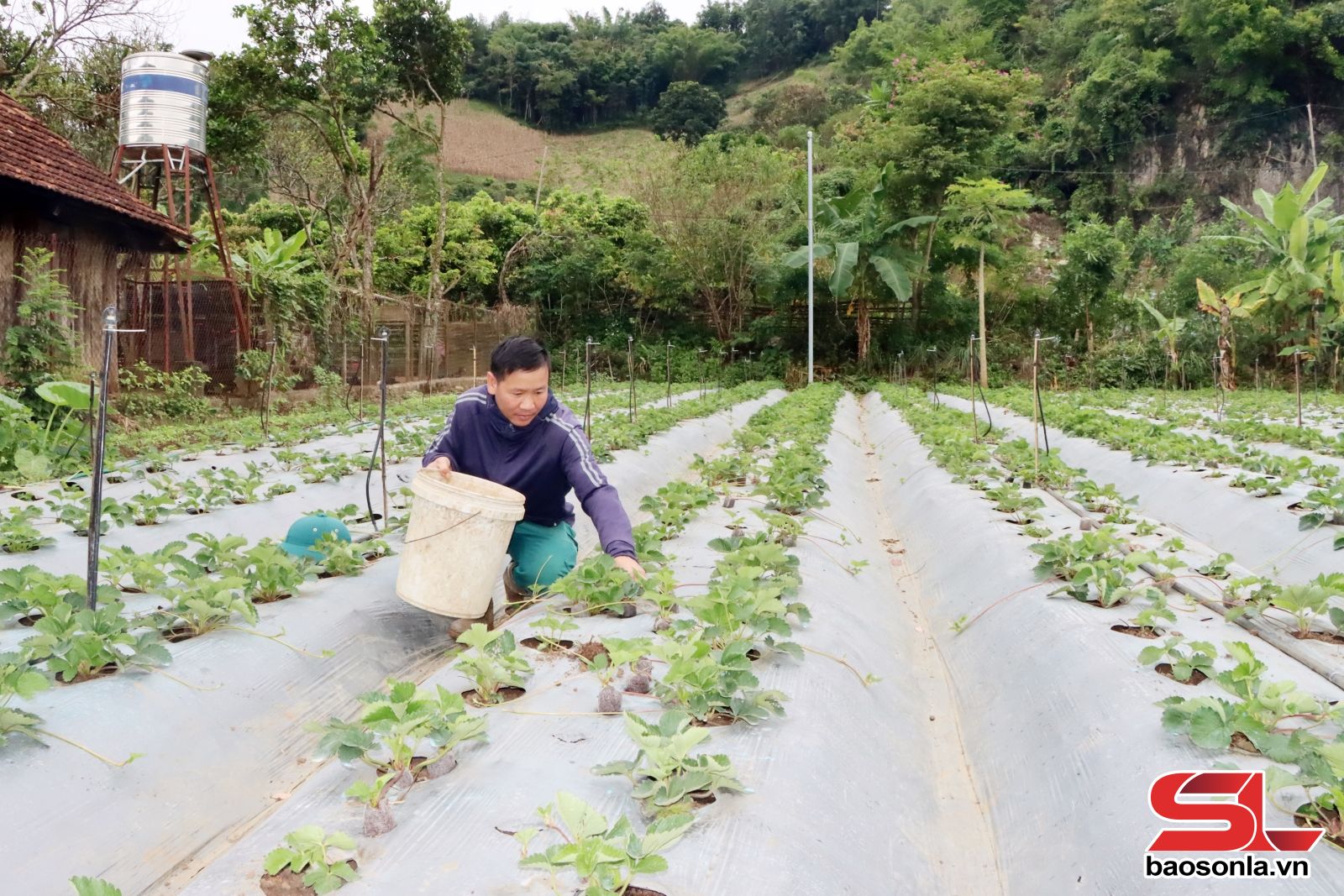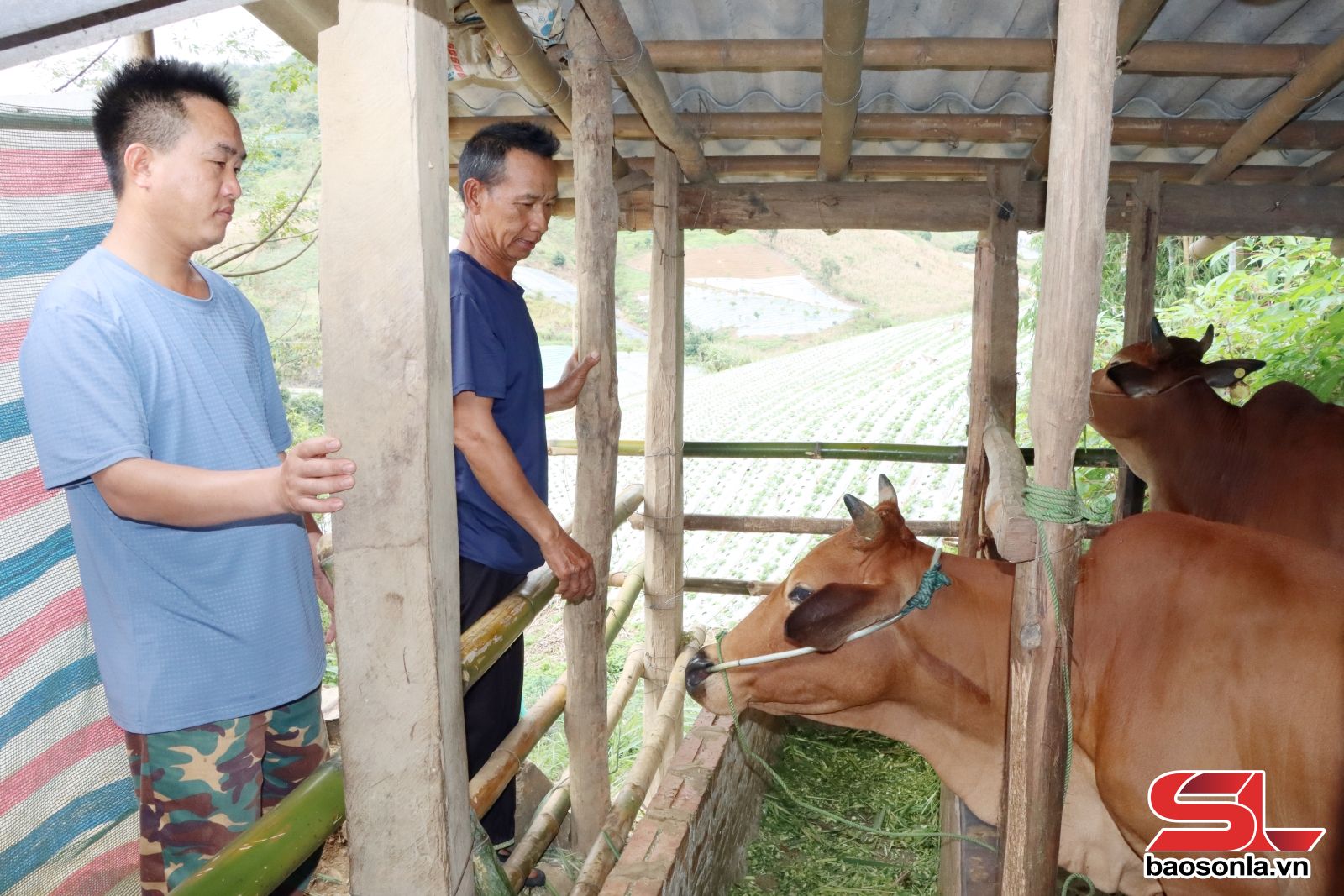

Farmers in Bo Duoi hamlet, Ta Hoc commune, grow strawberries.
At the beginning of 2024, thanks to Programme 1719 funding, the hamlet received an investment of nearly 1 billion VND (37,900 USD) to build a new 125sq.m cultural house. Lo Van Tan, Secretary of the Party cell and head of Mong hamlet, shared that since the new cultural house was built, local people have had a proper venue for meetings and community activities, and their spiritual life has become more vibrant.
In Keo Bo hamlet, home to 42 households with more than 200 residents, all of whom are of the Mong ethnic group, the remarkable transformation is clearly visible. Asphalt roads now reach the hamlet centre, solid houses have been built, and on the hillsides, locals are busy harvesting winter corn and planting new strawberry crops.
In recent years, the hamlet management board has actively guided residents how to apply scientific and technical advances in production, cultivating 41 hectares of corn, five hectares of strawberries, and raising over 200 buffaloes and cows. Poor and near-poor households have received support in the form of seeds, technical guidance, and infrastructure investment under Programme 1719 and the National Target Programme on New-style Rural Area Building. By the end of 2025, it is expected that eight households will escape poverty, reducing the number of poor households in the hamlet to just two.

A cattle-raising model in Keo Bo hamlet, Ta Hoc commune, is supported by Programme 1719.
Ta Hoc commune consists of 20 hamlets inhabited by Thai, Mong, Kho Mu, La Ha, and Kinh ethnic groups. During the 2021-2025 period, the commune has effectively utilised funding from Programme 1719, focusing on supporting poor, near-poor, and newly escaped poor households; investing in domestic water infrastructure; developing agricultural production; and upgrading schools, cultural houses, and roads.
Ngo Minh Tuan, Chairman of the communal People’s Committee, said that since 2021, under Programme 1719, the commune has received nearly 24 billion VND in support for the construction of various projects. These include internal roads in Pu Ten and Pa Hoc hamlets; a road to the production area in Keo Bo hamlet; a domestic water supply project in Pa No hamlet; cultural houses in Hoc, Bo, Mon, and Muong hamlets; a suspension bridge over the stream connecting Hoc hamlet with Xom Chau area, Muong hamlet, and another bridge over Hac stream to Pon hamlet; and livestock support for Keo Bo hamlet.
The commune has promoted the supervisory role of the Vietnam Fatherland Front and mass organisations, while strengthening communication and encouraging local residents to cooperate and participate in supervising and protecting public works. As a result, projects have been implemented smoothly and have proven effective immediately after completion.
Instead of relying solely on State support, local people have proactively restructured their crop systems, introducing and expanding high-yield and economically valuable plant varieties across the hamlets. Currently, local residents intensively cultivate 73 hectares of double-crop rice, over 1,700 hectares of hybrid corn, and 664 hectares of fruit trees, nearly 142 hectares of which follow organic practices. The commune also has 458 hectares of sugarcane, 57 hectares of coffee, 57 hectares of strawberries, and 73 hectares of vegetables, along with a total livestock and poultry population exceeding 70,500.
In 2025, the average per capita income is expected to reach nearly 35 million VND per year, while the poverty rate is projected to decline from 44.9% in 2021 to 27.51% in 2025 - an average annual reduction of 3.49%.
The implementation of Programme 1719 in Ta Hoc has created a strong driving force for improving the material and spiritual well-being of local residents.
To date, the commune has four schools ranging from preschool to secondary level, with 120 classes and more than 5,000 students. Three out of the four schools have achieved National Standard Level I certification. All commune roads have been paved, nearly 75% of inter-hamlet and main village roads have been concreted, 99.7% of households have access to the national power grid, and 99% have access to centralised clean water supply.
These achievements have contributed significantly to promoting sustainable socio-economic development in the ethnic minority areas.






















You have 500/500 characters left
Please enter 5 or more characters!!!